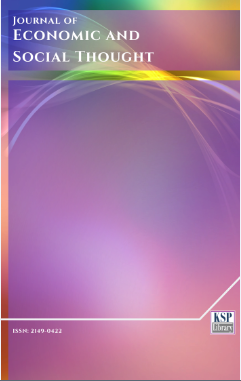Waqf for Poverty Alleviation: Challenges and Opportunities
Abstract
Abstract. This Study seeks to adapt the framework practiced by various MDBs particularly international Development Association (IDA) to the potential establishment of GobalWaqf fund as this framework is proven to be effective. The framework revolves around the IDA operations with replenishments, allocation of funds by implementing specific formulas and the determination approach which is mainly to monitor effectiveness of the earlier processes. Apart from this framework, it is suggested that a good governance system also plays a vital role in the raising and managing of the global waqf funds. This research is purely qualitative in nature by studying the mechanisms used in IDA and other MDBs and drawing their examples and experiences. The lessons learnt are meant to complement further the fundamentals of Waqf. This study finally proposes indicators that integrate with the targets of an Islamic vision of development, which could facilitate the allocation of funds. The steps to raise funds for global waqf fund are also proposed with the objective of creating more effective approach for raising of funds for a global Waqf fund.
Keywords: Waqf and Zakah, Islamic microfinance, Regulatory systems.
JEL. A13, D64, G21, G23, I38, O10.Keywords
References
Abul-Hassan, M. & Shahid, M.A. (2010). Management and development of the awqaf assets, Seventh International Conference - The Tawhidi Epistemology: Zakat and Waqf Economy, Bangi.
African Development Fund, (2009). Options to Improve the Cost-Effectiveness of the Replenishment Process, ADF-11 Mid-Term Review, Background Paper, October. [Retrieved from].
African Development Fund, (2010). African Development Fund-12 Report: Delivering Results and Sustaining Growth, Tunisia. [Retrieved from].
Ahmed, M.A. (2011). Official address by the IDB president at the the third langkawi Islamic finance and economics, (LIFE3): Waqf, Zakah, and Sadaqah as Community Empowerment Strategies for Economic Transformation of the Ummah: At the LIFE 3 Malaysia, Langkawi, 29 October. [Retrieved from].
Akin-Olugbade, A., & Flory, A. (2011). The concessional financing windows of the African Development Bank Group: Organization, decision making, and modalities, in Funds for Development Multilateral Channels of Concessional Financing, D. Gerd (Ed.) Asian Development Bank, pp.401-427. [Retrieved from].
Bassini, A. (2011). IDA: Governance and operations, Presentation Slides, International Development Association, July 12. [Retrieved from].
Droesse, G. (2011). Concessional financing of the Asian Development Bank: The Asian development fund and other channels of ADB concessional financing, in Funds for Development Multilateral Channels of Concessional Financing, D. Gerd (Ed.), Asian Development Bank, pp.299-393. [Retrieved from].
Geginat, C., & Kraay, A. (2007). Does IDA engage in defensive lending?, The World Bank, Working Paper. [Retrieved from].
Global Environment Facility, (2013). Mid-term review of the GEF system for transparent allocation of resources; comparison with other performance-based allocation systems, Technical Paper, No.2. [Retrieved from].
Hussein, K., Muhadinovic, M., Pedrosa-Garcia, J.A. (2013). Reinforcing the role of Arab development funds, Economic and Social Commision for Western Asia, Working paper, No.6. [Retrieved from].
Imtiaz, B.A. (2009). Waqf: A sustainable development institution for Muslim communities, [Retrieved from].
InterAction, (n.d.), International Development Association, Funding History.
International Development Association, (2003). IDA Results Measurement System: Progress and Proposals, April.
International Development Association, (2007). IDA’s performance-based allocation system: Options for simplifying the formula and reducing volatility, The World Bank, Board Report, No.38751. [Retrieved from].
International Development Association, (2007). IDA’s performance-based allocation system: Simplification of the formula and other outstanding Issues, The World Bank, Board Report, No.41148. [Retrieved from].
International Development Association, (2013). IDA support to transformational projects with regional impact, The World Bank, Board Report, No.75927. [Retrieved from].
International Development Association, (2013). The World Bank’s fund for the poorest, The World Bank, Board Report, No.75927. [Retrieved from].
Islamic Development Bank, (2006). Vision 1440H: A vision for human dignity. Safar.1427. [Retrieved from].
Islamic Development Bank, (2007). Policy paper on poverty reduction, April. [Retrieved from].
Kahf, M. (1999). Toward the Revival of Awqāf, A Few Fiqhī Issues to Reconsider, Center for Middle Eastern Studies, Harvard University. pp. 103-109.
Kahf, M. (2003). The role of Waqf in improving the Ummah welfare, [Retrieved from].
Martin, A.W. (2008). The World Bank’s International Development Association (IDA), Congressional Research Service Report for Congress, Update 1st April.
Mustafa, O.M. (2009). The objectives of Islamic banking: A maqasid approach, IIiBF Series in Islamic Banking and Finance, 1, [Retrieved from].
Operational Policy and Country Services, (2006), Country policy an institutional assessments, Independent Evaluation Group, [Retrieved from].
Sabit, M.T.H.M., & Iman, H.H.M.I. (2006). Obstacles of the current concept of Waqf to the development of Waqf properties and the recommended alternative, Malaysian Journal of Estate, 1(1), 27-38.
Salih, S.A. (1999). The challenges of poverty alleviation in IDB member countries, Islamic Development Bank, No.1420. [Retrieved from].
The Organisation for Economic Co-operation and Development (OECD) Website, [Retrieved from].
Villanger, E. (2007). Arab foreign aid: Disbursement patterns, aid policies and motives, Forum for Development Studies, 34(2), 223-256. doi. 10.1080/08039410.2007.9666378
World Bank Website, (2016). Millennium Development Goals, [Retrieved from].
Yaacob, H.H.J. (2008). Waqf accounting in the Malaysian State Islamic religious institutions: The case of federal territory, International Islamic University Malaysia, Working Paper, [Retrieved from].
Zuki, M.S.M., (2012). Waqf and its role in socioeconomic development, ISRA International Journal of Islamic Finance, 4(2), 173-178.
Zulkifli, H. (2010). An introduction to Islamic law of property in Malaysia, [Retrieved from].
DOI: http://dx.doi.org/10.1453/jest.v3i4.1087
Refbacks
- There are currently no refbacks.
Journal of Economic and Social Thought - J. Econ. Soc. Thoug. - JEST - www.kspjournals.org
ISSN: 2149-0422
Editor: jest@ksplibrary.org Secretarial: secretarial@ksplibrary.org Istanbul - Turkey.
Copyright © KSP Library




